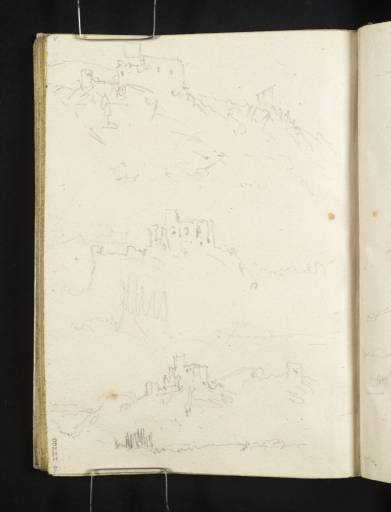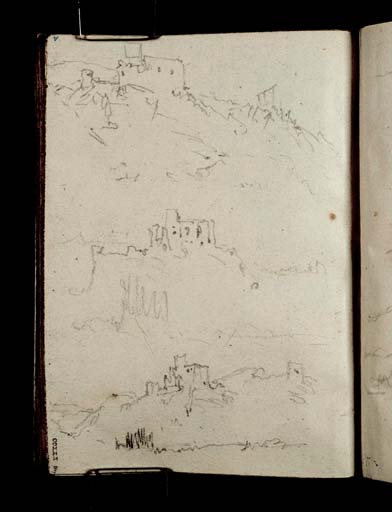Joseph Mallord William Turner The Château de Seyssuel on the Banks of the River Rhône 1828
Image 1 of 2
Joseph Mallord William Turner,
The Château de Seyssuel on the Banks of the River Rhône
1828
Folio 5 Recto:
The Château de Seyssuel on the Banks of the River Rhône 1828
D20998
Turner Bequest CCXXX 5
Turner Bequest CCXXX 5
Pencil on cream lined wove paper, 145 x 111 mm
Inscribed in blue ink by John Ruskin ‘4’ top left, upside down, and ‘5’ bottom left
Stamped in black ‘CCXXX 5’ top left, descending vertically
Inscribed in blue ink by John Ruskin ‘4’ top left, upside down, and ‘5’ bottom left
Stamped in black ‘CCXXX 5’ top left, descending vertically
Accepted by the nation as part of the Turner Bequest 1856
References
1909
A.J. Finberg, A Complete Inventory of the Drawings of the Turner Bequest, London 1909, vol.II, p.705, CCXXX 5, as ‘Three views of castle on hill’.
1983
Cecilia Powell, ‘Picture Notes: “A View overlooking a Lake”’, Turner Studies, vol.2, no.2, Winter 1983, p.57.
The three castle studies on this page are inverted relative to the sketchbook’s foliation. As identified by the geographer and Turner researcher Roland Courtot, they offer variant views of the Château de Seyssuel, a twelfth-century fortified castle on the left bank of the Rhône.1 Turner observed this landmark from his low vantage point on the river as he made the two-day boat journey from Lyon to Avignon. Each of the studies frames the castle from a different angle: the uppermost sketch is from upstream, with Turner looking south-east; the middle sketch offers a comparative profile from face-on; and the bottom sketch captures the view from downstream, as the artist looked back on his route. Additional studies of Seyssuel appear on folios 4 verso and 5 verso (D20997, D20999).
With the boat in continuous motion following the Rhône’s natural trajectory, Turner exploited the sketching opportunities afforded by a landscape unfolding before his eyes. Courtot saw his sketching practice as analogous to how one would use a camera today, a technique illustrated by the triptych effect on this page.2 Turner was especially drawn to striking architectural features such as a distant village, a hilltop castle or an approaching bridge. A recurring feature of the sketchbook, these ‘tracking shots’ can be seen intermittently between folios 12 verso and 33 verso (D21013, D21029, D21037, D21041, D21052–D21053; Turner Bequest CCXXX 32 and 32a).
Citing the present work, Cecilia Powell has commented on Turner’s fondness for castles. See under folio 3 verso (D20995) for a summary of her analysis.
Hannah Kaspar
March 2024
Roland Courtot, ‘6. Le carnet du voyage de Turner de Lyon à Marseille (CCXXX) (1)’, Carnets de voyage de Turner, accessed 29 January 2024, https://carnetswt.hypotheses.org/463 .
Roland Courtot, ‘Turner et le Rhône, des carnets “géographiques”’, accessed 29 January 2024, https://amu.hal.science/hal-02875532 .
How to cite
Hannah Kaspar, ‘The Château de Seyssuel on the Banks of the River Rhône 1828’, catalogue entry, March 2024, in David Blayney Brown (ed.), J.M.W. Turner: Sketchbooks, Drawings and Watercolours, Tate Research Publication, February 2025, https://www


